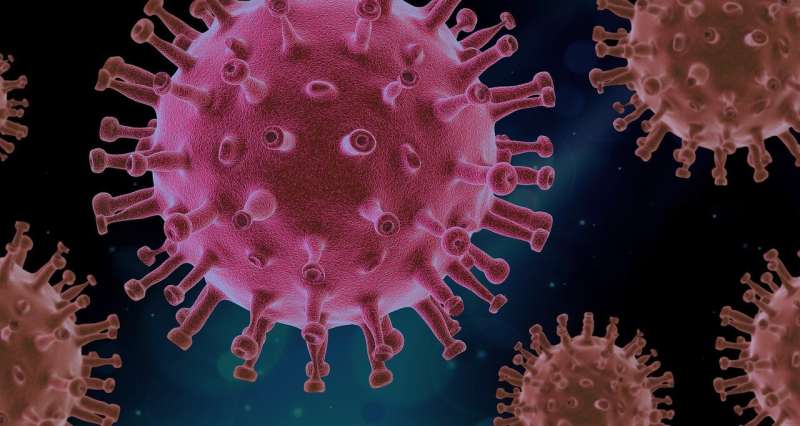This article has been reviewed according to Science X's editorial process and policies. Editors have highlighted the following attributes while ensuring the content's credibility:
fact-checked
peer-reviewed publication
trusted source
proofread
Research quantifies effect of chronic diseases on racial disparity in COVID-associated hospitalizations

LSU Health New Orleans conducted the first research using disease surveillance data to quantify the effect of chronic diseases on racial disparity in COVID-associated hospitalizations.
The research team, led by Xiao-Cheng Wu, MD, MPH, Professor and Director of the Louisiana Tumor Registry at LSU Health New Orleans School of Public Health, reports that chronic diseases explained almost two-fifths of the racial disparity in COVID-associated hospitalizations among cancer patients, specifically common chronic diseases such as hypertension, diabetes and chronic kidney disease.
The study's findings are published in the Journal of the National Cancer Institute.
"Our research findings offer compelling evidence, underscoring that longstanding racial health discrepancies, particularly in chronic disease management, substantially contribute to the significantly higher COVID-19-associated hospitalization rates among non-Hispanic Black cancer patients than their non-Hispanic White counterparts," notes Dr. Wu.
Cancer patients are at increased risk for severe complications from COVID-19 due to factors like aging, immunosuppression, and having other diseases or medical conditions at the same time. They have experienced notably higher COVID-associated hospitalization and overall mortality rates than the general population. Research has also shown that African-American cancer patients have higher odds of COVID-associated hospitalizations and worse outcomes than their white counterparts.
This retrospective study was based on data from LSU Health New Orleans' Louisiana Tumor Registry and the Louisiana Department of Health. The researchers first linked the data on Louisiana residents aged 20 and older and diagnosed with first primary cancer cases between 2015 and 2019 with the COVID-19 data to identify cancer patients who tested positive for COVID-19 by RT-PCR or antigen test in 2020.
Then, they linked cancer patients who tested positive for COVID-19 with the 2020 statewide hospital inpatient discharge data to identify those with COVID-associated hospitalizations.
Of 6,381 cancer patients who tested positive for COVID-19, 31.6% were non-Hispanic Black cancer patients. They had a higher prevalence of chronic diseases than non-Hispanic White cancer patients (79.5% vs. 66.0%) and higher COVID-associated hospitalization (27.2% vs. 17.2%).
The odds of COVID-associated hospitalizations were 80% higher for non-Hispanic Black cancer patients than non-Hispanic White cancer patients. Non-Hispanic Black cancer patients were younger and had a higher percentage of Medicaid. They were more than twice as likely to live in high-poverty areas.
"This article stands as a fruitful outcome arising from a collaborative effort across diverse entities, including LSU Health New Orleans' Louisiana Tumor Registry, Stanley Scott Cancer Center, and School of Medicine, and the Louisiana Department of Health," adds Dr. Wu.
"Dr. Augusto Ochoa has been instrumental in driving this collaborative study forward. I hope our research findings will propel multi-faceted endeavors to address the root causes of racial differences in health disparity, including chronic disease management."
"The findings presented in this important publication are the result of an outstanding collaboration between the National Cancer Institute and the Louisiana Tumor Registry led by Dr. Wu," says Dr. Augusto Ochoa, Principal Investigator of the Gulf South Minority/ Underserved Clinical Trials Network at LSU Health New Orleans and Director of its Stanely S. Scott Cancer Center.
"This work demonstrates that COVID-19 infection exacerbates the health disparities caused by Cancer in the most underserved populations in our state. Therefore, it is our responsibility to work with the state and the NCI to build a world class NCI-Designated Cancer Center that can develop ways of addressing and resolving the inequalities created by COVID-19 and cancer."
LSU Health New Orleans Louisiana Tumor Registry is a statewide population-based cancer registry authorized by law to collect data on all reportable cancer cases occurring among Louisiana residents. One of only 22 cancer registries in the country comprising the National Cancer Institute's SEER Program, the Louisiana Tumor Registry at LSU Health New Orleans is considered to be one of the leading cancer registries in the nation.
More information: Xiao-Cheng Wu et al, Effect of chronic disease on racial difference in COVID-19–associated hospitalization among cancer patients, JNCI: Journal of the National Cancer Institute (2023). DOI: 10.1093/jnci/djad150



















